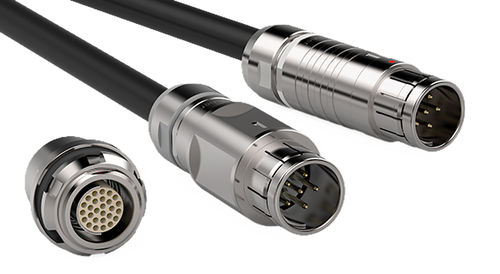In the aerospace and defense industries, the reliability and performance of electronic systems are paramount. Shielded circular connectors play a critical role in ensuring that these systems operate flawlessly by protecting against electromagnetic interference (EMI) and radio frequency interference (RFI). This article explores the importance of shielded circular connectors in aerospace and defense applications, highlighting their benefits, specific requirements, and key considerations for their use.
Importance of Shielded Circular Connectors
Protecting Sensitive Electronics
Critical Systems: Aerospace and defense systems often involve sensitive electronics that are crucial for navigation, communication, and control. Shielded circular connectors help to protect these systems from EMI and RFI, ensuring accurate and reliable operation.
Interference Mitigation: The high levels of electromagnetic and radio frequency interference in aerospace and defense environments can significantly impact the performance of electronic systems. Shielded connectors mitigate these effects, preserving signal integrity and preventing data corruption.
Ensuring Operational Reliability
Harsh Environments: Aerospace and defense applications frequently involve exposure to extreme conditions, including high altitudes, vibrations, and temperature variations. Shielded connectors are designed to withstand these harsh environments while maintaining reliable performance.
Mission Success: In defense applications, the success of missions often depends on the flawless operation of electronic systems. Shielded circular connectors contribute to mission success by ensuring that communication and control systems function without interference.
Specific Requirements for Aerospace and Defense
Shielding Effectiveness
High-Frequency Protection: Aerospace and defense systems require connectors that provide effective shielding against high-frequency EMI and RFI. This is crucial for maintaining the performance of high-speed data and communication systems.
Robust Construction: The connectors must be built to withstand mechanical stresses, such as vibrations and shocks, which are common in aerospace and defense environments. This includes using materials and construction techniques that enhance durability and reliability.
Environmental Protection
Sealing and Durability: Shielded connectors used in aerospace and defense applications must be sealed to protect against moisture, dust, and other environmental contaminants. The connectors should also be resistant to temperature extremes and chemical exposures.
Ingress Protection (IP) Ratings: Connectors should meet specific IP ratings to ensure they can operate effectively in demanding environments. Proper sealing and construction are essential to achieve these ratings.
Compliance with Standards
Military Standards: Many defense applications require connectors that comply with military standards such as MIL-DTL-38999 or MIL-DTL-26482. These standards specify performance criteria for connectors used in military and aerospace applications.
Certification: Connectors must be certified to meet industry and military requirements for performance, safety, and reliability. This includes rigorous testing and validation processes to ensure compliance.
Key Considerations for Selection
Connector Type and Configuration
Type: Choose the appropriate type of shielded circular connector based on the specific application needs, such as the number of pins, size, and shape. Common types include MIL-DTL-38999 for high-performance applications.
Configuration: Ensure that the connector configuration matches the system requirements, including pin arrangement and electrical specifications.
Shielding Material and Design
Material: Select shielding materials with high conductivity and effectiveness for the frequencies of concern. Common materials include copper and aluminum, often used in combination for enhanced performance.
Design: Consider connectors with multi-layer shielding for robust protection. This may include foil, braid, or solid metal shields to address various interference sources.
Reliability and Maintenance
Durability: Opt for connectors that offer high durability and are designed to withstand the operational stresses typical in aerospace and defense applications. This includes factors like vibration resistance and mechanical durability.
Maintenance: Choose connectors that are easy to maintain and replace, if necessary. Modular designs and standardized interfaces can simplify maintenance and reduce downtime.
Applications in Aerospace and Defense
Aerospace Systems
Aircraft: Shielded circular connectors are used in aircraft systems for avionics, communication, and control. Their shielding ensures that sensitive avionics and navigation systems operate without interference.
Satellites: In space applications, connectors must withstand the harsh environment of space while providing reliable signal transmission. Shielded connectors protect against EMI and RFI from various sources, including the spacecraft’s own systems.
Defense Systems
Military Vehicles: Shielded connectors are used in military vehicles to ensure reliable communication and control systems. They protect against EMI from onboard systems and external sources.
Weapons Systems: In weapons systems, connectors must ensure precise control and communication. Shielded connectors provide the necessary protection against interference to maintain operational accuracy.
Conclusion
Shielded circular connectors are essential components in aerospace and defense applications, providing critical protection against EMI and RFI while ensuring reliable performance in harsh environments. By selecting the right connectors with appropriate shielding, environmental protection, and compliance with standards, you can ensure that electronic systems operate effectively and contribute to the success of aerospace and defense missions. Understanding the specific requirements and considerations for these connectors helps in making informed decisions and achieving optimal performance in demanding applications.

